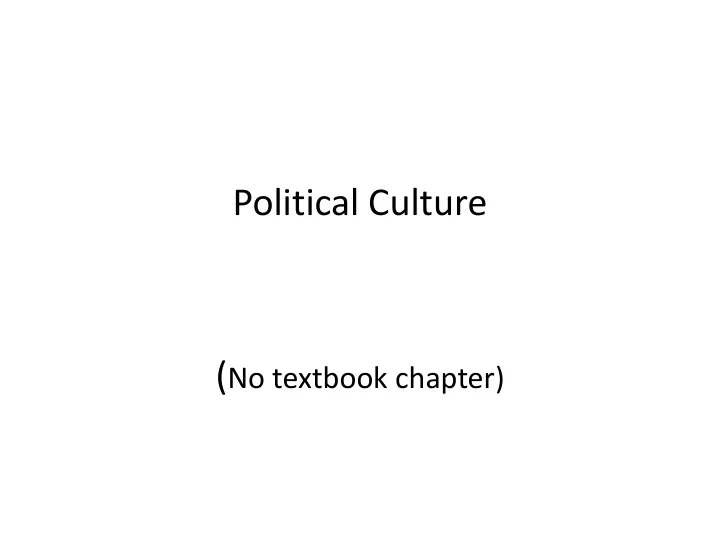

Political Culture ( No textbook chapter)
Groups of people know a lot of things without being taught - Examples We know these things, and many others, because we share a culture
Culture: a set of values, beliefs, ideas, and desires common to some group A culture tells us: – What’s appropriate / inappropriate – What’s popular / unpopular – What’s right / wrong – What’s good / bad – Who is / isn’t “one of us” Cultures are one of the most important ways that we define who “we” are
In reality, every one of us is made up of many different cultures – Age group, ethnicity, religion, where you live, economic status, and other things all contribute – By their nature, cultures unite some people and divide them from others – As Americans in 2010, we all partake to some extent in shared understandings about the world that make us “us” and differentiate us from the rest of the world
• One of the most distinctively American features is our political culture – A common set of values, ideas, & preferences about government & politics • Ex: Americans generally resist the idea that the government should pay for health care for all citizens • We’re the only democratic country on the planet that DOESN’T provide it
Understanding a group’s culture makes it easier to understand the group’s choices and preferences – We know that politics are about values & resources, our political culture tells us a lot about which values & whose resources matter • Should companies that get “bailout” money from the government be giving out billions in bonuses? • When times are tough, should the government cut services to people or borrow/raise money to keep programs & services?
American political culture has its roots in a philosophy called classical liberalism • CL is a philosophy that puts the individual at the center of the social and political world Throughout history, group needs have taken precedence over individual desires in most cultures
Classical Liberalism emerged in the 1600s & 1700s – Grew & evolved out of the Enlightenment • Separates a “modern” world from an “ancient” world
Key Enlightenment beliefs: • The universe is rational • We can best understand events through science – Interpreting events through religious lenses is a major element of the ancient world • Human life has intrinsic value – Your worth is not based on what you can do • Human beings are perfectible – The right education, upbringing, etc. can make us better people Classical liberalism takes these Enlightenment beliefs and applies them specifically to politics & government
If it’s true that our own knowledge and understanding can make our physical lives better • Medicine, agriculture, transportation, etc. Then perhaps that same understanding can make our social and political lives better.
But, which ideas? Classical Liberalism tells us: 1. Before there was government, mankind lived in a “State of nature” a) There was no government, “perfect freedom” b) You had as much security as you could guarantee for yourself c) That is, not very much
Because life in the State of Nature is violent and uncertain: 2. Individuals voluntarily create governments a) Governments are human creations, not God’s b) We voluntarily trade some of our “perfect freedom” for security – but just some c) This is often called the “social contract” d) Remember, a contract must benefit all concerned. We are expected to obey the laws, but the government has responsibilities as well
Governments are created by us because they make us better off than we would be without them. • That is, governments are created for a purpose:
3. Governments are created by us to protect our natural rights – Traditionally, these are “life, liberty, and property ” – Why property?
The purpose of the classical liberal government is to protect individuals from abuse by others, so that each can achieve her own vision of the “good life.”
4. Thus, government’s power should be limited • It exists to protect our basic rights • It’s role is not to make choices for us • People can, will, and should suffer consequences from their poor choices
Bad choices
In a classical liberal world, Mr. Cool Ice can and should have the freedom to get all the stupid tattoos he wants.
– My responsibility is to tolerate his choices • I don’t have to approve, and I certainly don’t have to hire him if I have a job opening
– If he can’t get a decent job because he looks like an idiot, that’s his problem • CL desires a very individualistic world of choices and consequences
Americans who consider themselves “liberal” or “conservative” usually disagree on a lot of things… …But usually, they disagree on details , not fundamental things
For Example: • American liberals tend to worry more about inequality than American conservatives • BUT, American liberals are quite conservative by world standards
• American conservatives, on the other hand, tend to be more concerned about “public morality” or social order… • …while American liberals tend to be less concerned about public values than individual expression
American liberals and conservatives both claim to want more “freedom”… …but both seem very willing to use the government’s power to get what they think is best.
One thing most Americans agree on is that the US is a unique place, better than the rest of the world. • “American Exceptionalism” Many Americans believe that what works here should work everywhere – This doesn’t always make us popular tourists
Recommend
More recommend